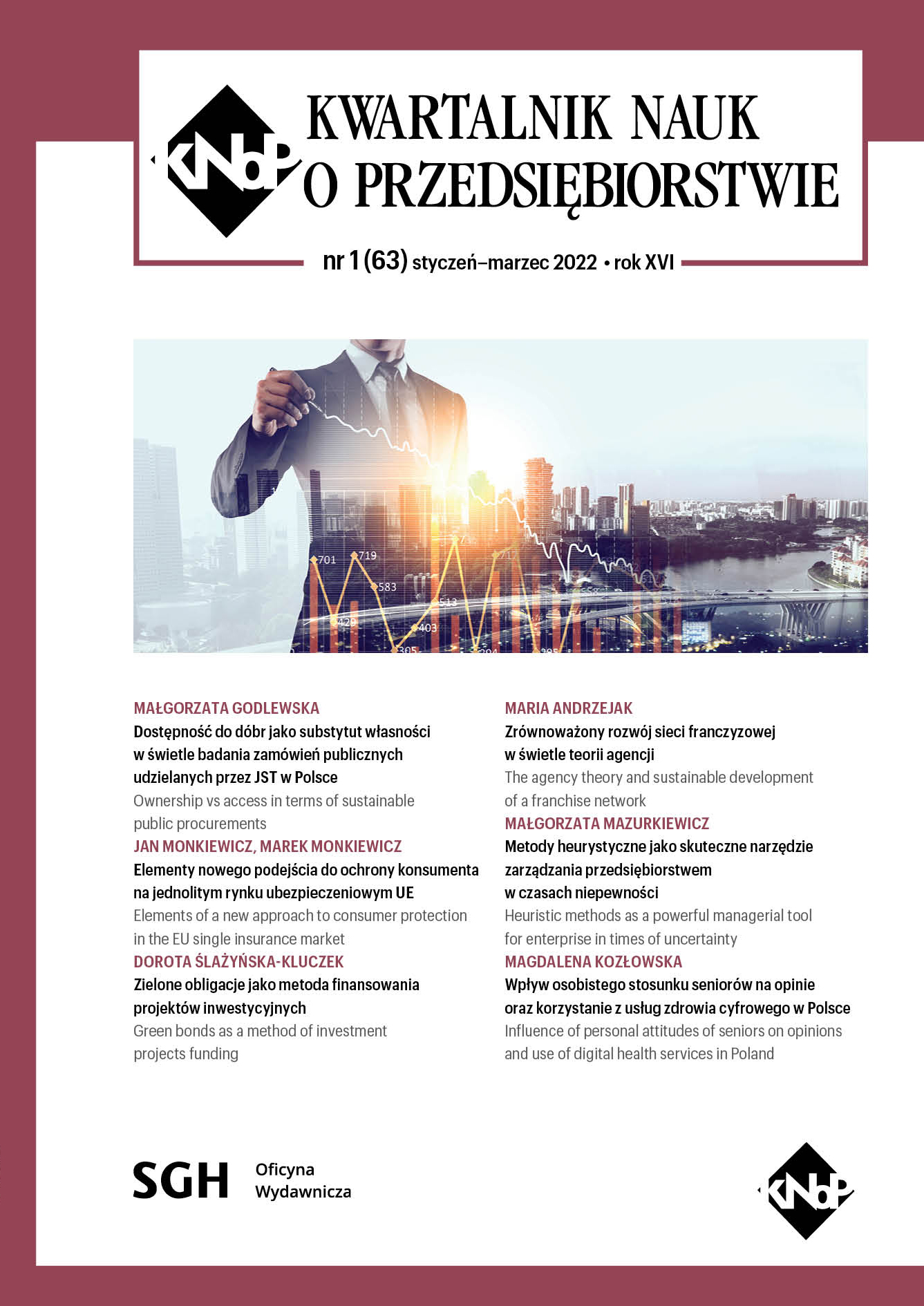Influence of personal attitudes of seniors on opinions and use of digital health services in Poland
Main Article Content
Abstract
Seniors are a special group of consumers in Poland, whose importance is growing every year. The medical services sector seems to be of particular importance here, among which the growing trend is digital health. Seniors as consumers have defined needs that result from their specific psycho-physical conditions and habits, which are their second nature. The personal attitude of seniors to digital health and its impact on opinions and the use of digital health services is the main problem of the publication and one of the aspects of quantitative research conducted by the author in July 2021. The publication attempts to analyze the relationship between the personal attitude of seniors towards digital health tools and services and opinions and experiences. The results of the quantitative study showed the relationship between trends and the possible impact of the attitude of seniors on their activity in the digital medical services market and the image of their experiences.
Downloads
Article Details
The author of the article declares that the submitted article does not infringe the copyrights of third parties. The author agrees to subject the article to the review procedure and to make editorial changes. The author transfers, free of charge, to SGH Publishing House the author's economic rights to the work in the fields of exploitation listed in the Article 50 of the Act of 4 February 1994 on Copyright and Related Rights – provided that the work has been accepted for publication and published.
SGH Publishing House holds economic copyrights to all content of the journal. Placing the text of the article in a repository, on the author's home page or on any other page is allowed as long as it does not involve obtaining economic benefits, and the text will be provided with source information (including the title, year, number and internet address of the journal).
References
2. Batorski D. (2009), Wykluczenie cyfrowe w Polsce, w: Społeczeństwo informacyjne, D. Grodzka (red.), „Studia BAS”, 2009, nr 3 (19), s. 223–249.
3. Batorski D. (2011), Korzystanie z technologii informacyjno-komunikacyjnych, w: J. Czapiński i in., Quarterly of University of Finance and Management in Warsaw, Vol. 5, Issue 3, September 2011.
4. Beauvior S. (2011), Starość, Wydawnictwo Czarna Owca, Warszawa.
5. Berdyga T., Cianciara D., Kawwa J., Nowicka-Wasilewska J., Pinkas J., Sitarek M., Zgliczyński W. (2013), Telemedycyna w Polsce – bariery rozwoju w opinii lekarzy, Medycyna Ogólna i Nauki o Zdrowiu, Tom 19, Nr 4, 496–499.
6. Błachnio A. (2015), Telegeriatria. Innowacje technologiczne a jakość życia seniorów. Realność złego starzenia się poza społeczną i polityczną powinnością, Przestrzeń zdrowia publicznego, pdf, s. 237–250.
7. Błędowski P., Kubicki P., Szatur-Jaworska B., Szweda-Lewandowska Z. (2012), Raport na temat sytuacji osób starszych w Polsce, Instytut Pracy i Praw Socjalnych, Warszawa.
8. Bojanowska E. i.in. (2015), Taksonomia funkcjonalnych kompetencji cyfrowych oraz metodologia pomiaru poziomu funkcjonalnych kompetencji cyfrowych osób z pokolenia 50+, Stowarzyszenie „Miasta w Internecie”.
9. Bombol M., Słaby T. (2011), Konsument 55+ wyzwoleniem dla rynku, Oficyna Wydawnicza Szkoły Głównej Handlowej w Warszawie, Warszawa.
10. Bujnowska-Fedak M. M., Drobnik J., Grata-Borkowska U. T. (2015), Postawa wobec aplikacji telemedycznych, ich znajomość i zastosowanie w pracy lekarzy i rehabilitantów – doniesienie wstępne, Family Medicine & Primary Care Review, 17, 2: 103–106.
11. Bujnowska-Fedak M. M., Kumęga P., Sapilak B. J. (2013), Zastosowanie nowoczesnych systemów telemedycznych w opiece nad ludźmi starszymi, Family Medicine & Primary Care Review,
15, 3: 441–446.
12. Bujnowska-Fedak M. M., Tomczak M. (2013), Innowacyjne aplikacje telemedyczne i usługi e-zdrowia w opiece nad pacjentami w starszym wieku, Zdrowie Publiczne i Zarządzanie, 11 (4): 302–317.
13. Dane ABM (2021), Seniorzy w cyfrowym świecie, Desk Research, Warszawa.
14. Dąbrowska A., Gutkowska K., Janoś-Kresło M., Słaby T. (2016), Wykluczenie społeczne – jakość i godność życia osób w wieku 60+ rdzennych mieszkańców wsi w Polsce, SGH, Warszawa.
15. Dąbrowska A., Janoś-Kreśło M. (2018), Polscy seniorzy na rynku usług e-zdrowia, DOI:
10.34616/23.20.119, s. 225–241.
16. GUS (2016), Ludność w wieku 60 lat, struktura demograficzna i zdrowie, GUS, Warszawa.
17. GUS (2018), Informacja o sytuacji osób starszych na podstawie badań GUS, Warszawa.
18. GUS (2020), Sytuacja osób starszych w Polsce w 2018 roku, GUS, Warszawa.
19. Popiołek M. (2013), Wykluczenie cyfrowe w Polsce, Uniwersytet Opolski.
20. Tarkowska E., Zaręba I. (2015), E-wykluczenie a agizm. Wiek senioralny w teorii i w codzienności, Zeszyty Naukowe WSHE, Włocławek.

